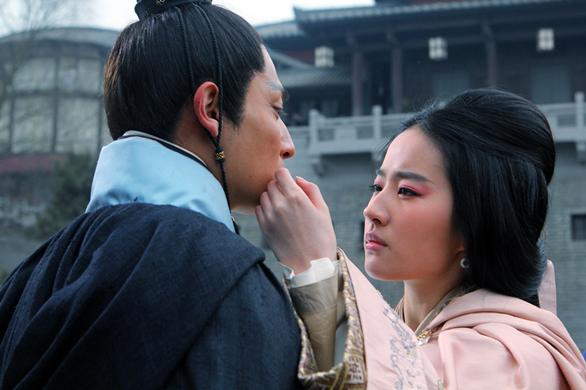My knowledge of the history and culture of Imperial China is not exactly ‘up to scratch’. So I found myself doing quite a lot of impromptu research both during and after my viewing Zhao Linshan’s epic melodrama The Assassins.
The opening scenes show a mysterious underground camp where the abducted children of Cao Cao’s dead enemies are put into training to become assassins. Skip forward to the year 221 AD and the kids they are all grown up, and the story places its focus on the final years of Cao Cao, Chancellor of the East Han Dynasty during the Three Kingdoms period as series of attempts his life begin to occur. The Chancellor stands as the final power preventing the collapse of the Han throne. Though Emperor Xian seems more interested in singing opera to himself than his own enormous power, rumours that Cao Cao wants the throne for himself drive the Emperor to plot against the Chancellor. All the while, the four elemental stars are about to align, which according to an ancient prophecy means that a new dynasty will arise.
The story-telling here may leave you slightly in the dark if you don’t know much about the history/culture of this period. There is much talk of things like the number of years of “Jian’an” which is not explained, and not much detail is given on Cao Cao’s former years. Admirable though it is that the director would give the audience such intellectual credit, some further exposition would perhaps help.
This lack of explanatory sequences does, however, mean there’s more time for the films set pieces, which are thoroughly entertaining. The opening training scenes or the showdown between the Cao Cao and Mu Shun for instance are both kinetic and exciting. Certain sequences though (such as an early attack on Cao Cao’s estate by a small army of assassins) almost push it too far – we watch as they fire a vast number of elasticated ropes across the courtyard thereby constructing a bouncy net which they use to spring over the ensuing guards. At these points, however, you simply have to remind yourself that this is melodrama. And, indeed, it truly embraces this style in all facets, swordplay and romance alike.
In terms of the genre, The Assassins hits all the marks: the set design is lavish; the costumes, impractically beautiful; the editing and sound design stay just the right side of cartoonish. The orchestral score swells at all the right moments and, despite the confusion presented by the narrative, all this together just about habilitates the tugging of heartstrings.
Because, of course, once you’ve got your head round the history the real story is a human one – and one that is accessible due to the performances. Yifei Liu and Hiroshi Tamaki are both very good as Gong Ling Ju and Mu Shun, framing the story as two orphans who fall in love during the assassin training of their childhood. Alec Su is suitably pathetic as Emperor Xian, but he is really just the foil for Chow Yun Fat’s magnificent portrayal of The Chancellor. And Cao Cao is as interesting a central figure as one could hope for in a film like this.
There have been quite a number of films based on this period of Chinese history in which Cao Cao is most often portrayed as an unsympathetic tyrant. Here, conversely, the audience is presented with a revolutionary whose ingenuity in military tactics has left him with the heavy burden of responsibility on his shoulders as well as a complicated relationship with his son.
with the heavy burden of responsibility on his shoulders as well as a complicated relationship with his son.
For those familiar with the history of the Han Dynasty, the inner turmoil of the man whom history has (possibly unfairly) painted as a villain may delight and fascinate. Indeed we begin to see the man through the eyes of Ju who (despite gaining his confidence all in the name of killing him), slowly gets to know the gentle side of the warlord and his worthy intentions. She helps to ease the tremendous headaches and night terrors from which Cao Cao suffers and understands the woes that he faces – she is our ticket past the harsh persona of The Chancellor and into his tormented soul.
Of course, none of this could be of any interest to you. It depends entirely on whether you allow a Chinese historical melodrama such as this to seduce you. And, though it’s not up there with the best of the genre (may I suggest John Woo’s Red Cliff), The Assassins will make for fine Friday night viewing.






